“Special training” required to use industrial robots
Like driving schools, there are also robot schools. These robot schools deal with industrial robots such as robotic arms. Today, the use of collaborative robots (cobots) which work with humans in the same workspace is gradually increasing. Some of these cobots are made with materials that won’t hurt people if they come in contact with each other or are able to stop immediately when they sense a collision with humans. On the other hand, since industrial robots used at factories are extremely powerful and move at high speed, operation without proper training may cause serious accidents. To prevent such accidents, it is necessary for operators to attend robot schools and receive special training.
This article introduces the special training required in Japan for operating industrial robots with the topics of brief overview of the training, the required courses, and the curriculum offered by Kawasaki Robot School.
What is the special training for industrial robots?

The objective of the special training is to secure the health and safety of workers. It is specified in Article 59-3 of the Industrial Safety and Health Act described below (*1)
(*1) Ministry of Health, Labour and Welfare: Shokuba no Anzen Site (Website for workplace safety) * The information is available in Japanese.
Industrial Safety and Health Act: Article 59-3
The employer shall, when a worker is to be placed in the dangerous or harmful operations provided for by the Ordinance of the Ministry of Health, Labour and Welfare, give the worker the special education for safety and/or health concerning the said operations, as provided for by the Ordinance of the Ministry of Health, Labour and Welfare.
“The special education for safety and/or health concerning the said operations” in Article 59-3 refers to the special training. As clarified in the Industrial Safety and Health Act, the employer (the management) is responsible for conducting the special training. If it is not performed, workers as well as the employer will be accused. To secure the safety of operating workers and to prevent work-related injuries, employers need to be aware of the necessity of the special training.
Article 36 of the Ordinance on Industrial Safety and Health (*2) , an ordinance of the Ministry of Health, Labour and Welfare specifies 49 tasks that require the special training in Japan (as of April 2018). These tasks include arc welding and operation of forklifts with a maximum load of less than 1 ton.
(*2) Japan Industrial Safety and Health Association, Safety and Health Information Center * The information is available in Japanese.
The items concerning industrial robots are “Work pertaining to instruction, etc.” (teaching) in Article 36-31 and “Work relating to inspection, repair or adjust” (maintenance) in Article 36-32, which will be explained later. In other words, the operation of industrial robots requires the special training following Article 36-31 (instruction) and the inspection of industrial robots requires the special training following Article 36-32 (inspection).
What can be learnt from the special training for industrial robots?
Concerning the contents of the special training for industrial robots, the subjects and the hours are set forth in Article 18 (teaching) and Article 19 (inspection) of the Rules on the Special Training for Safety and Health.
Teaching of industrial robots
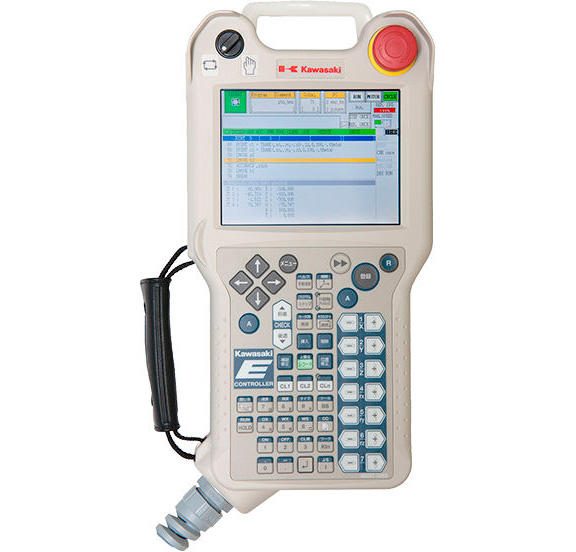
Teaching is a process to instruct robots about location, speed, work order, etc. To make robots function properly and to automate operations with robots such as welding and handling, this is an essential process. This special training consists of the following classroom lectures and practical trainings to learn the teaching processes and the possible hazards.
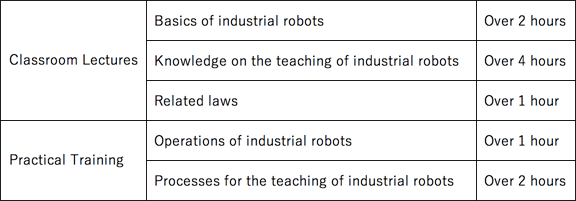
Inspection of industrial robots
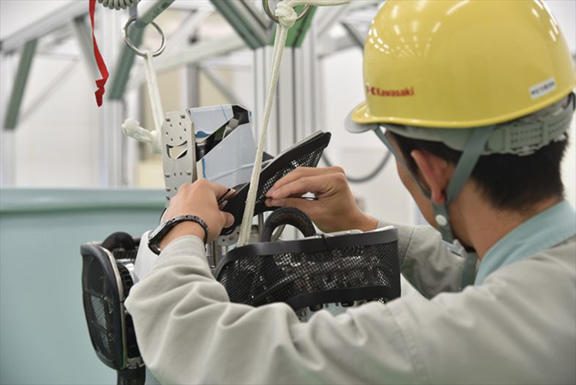
Inspection is a maintenance work to check, adjust and repair robots. Since it is necessary to know precisely about how to handle robots as well as about how each part is structured and what types of parts are there, the special training for this process requires longer hours as shown below compared to the special training for the teaching of industrial robots.
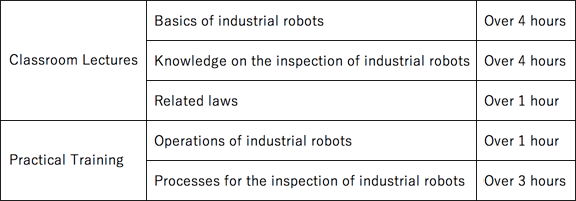
Special training at Kawasaki Robot School
As previously mentioned, employers are the ones responsible for conducting the special training for industrial robots. However, employers may utilize training courses organized by robot manufacturers or local governments. Let’s see how Kawasaki Robot School offers courses for the special training.
The special training courses offered by Kawasaki Robot School are available in three locations: Kansai Region (Hyogo Prefecture), Chubu Region (Aichi Prefecture) and Kanto Region (Tochigi Prefecture). The courses and curriculums are organized by operation such as handling, picking, painting, spot welding, arc welding and duAro (human-robot collaboration). The “Basic Courses” deal with the teaching process and the “Maintenance Courses” cover inspection.
*Please note that Kawasaki Robot School is open for the customers of Kawasaki Heavy Industries only. It is not available to the general public.
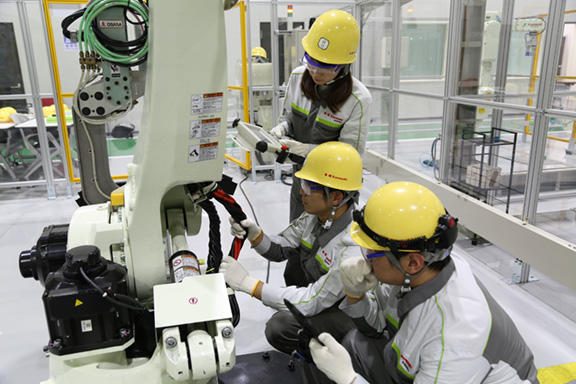
The size of one class at Kawasaki Robot School is small, with a maximum of 8 people. If there are significant discrepancies in comprehension among participants, classes may be further divided. The contents of courses may be adjusted by input from participants and can be flexibly customized upon request even if the items are not originally covered in the curriculum.
Many different types of robots exist, and Kawasaki Robot School prepares the closest robots to the actual robots used by the customer. By doing so, it will make the courses more practical. This is one of the advantages of the special training organized by a robot manufacturer.
Safely use robots with the special training!
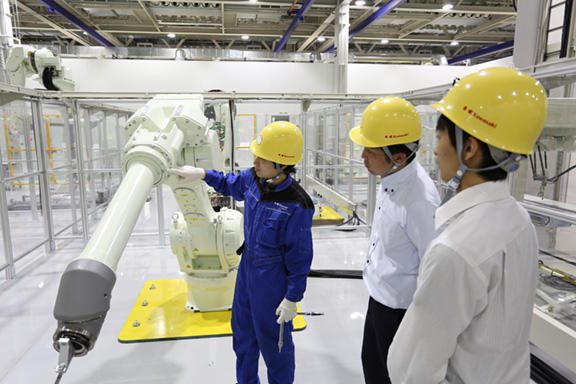
The special training for industrial robots is essential to secure the safety of workers. Passing an exam is required to obtain a driver’s license but there are no exams to pass for the special training of industrial robots. However, taking the special training is strongly recommended before starting the operation of robots.
Kawasaki Robot School particularly focuses on practical trainings so customers can master the proper handling of robots. If there are any questions about the content, please feel free to contact our sales representatives at Kawasaki.